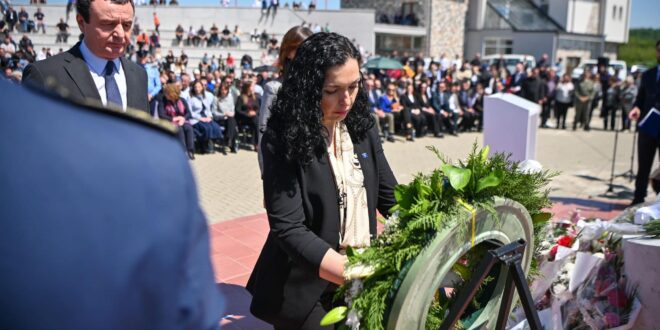Experts fear a ‘presidential’ commission for truth and reconciliation in Kosovo will not enjoy the required independence from political influence or legitimacy among all ethnic communities.
Kosovo is to make a fresh attempt to create a truth and reconciliation commission that will look at the events of the 1998-99 war, but experts warn it risks failing from the start if it is not free of political influence.
Former Kosovo President Hashim Thaci first mooted the idea of a truth and reconciliation commission in 2018, calling it an opportunity to address “certain lingering uncertainties and injustices”. But the initiative faltered after he resigned in 2021 to face war crimes charges in The Hague stemming from his role as a guerrilla commander during the war.
Now Thaci’s successor as president, Vjosa Osmani, has taken up the baton, based on the government’s Transitional Justice Strategy adopted this year and which calls for the creation of a ‘Presidential Commission for Truth and Reconciliation’.
“The president’s legal team is drafting the act that will define the mandate, duties and responsibilities of the Presidential Commission for Truth and Reconciliation, as well as its full name, which will align with the mandate outlined in the Transitional Justice Strategy,” presidential spokesperson Bekim Kupina told BIRN.
He said the initiative would “address the legacy of the past and help peace and reconciliation” among communities, and would begin within Osmani’s current term, which ends in March 2026.
Experts, however, say the approach is already flawed. Typically, such commissions are investigative bodies that operate independently of institutional and political influence, despite being created by the state. Without such independence, it is unlikely to gain the trust of all communities in Kosovo, notably the minority Serbs.
In the government’s Transitional Justice Strategy, “it has not been properly explained what the mandate of such a commission would be”, said Bekim Blakaj, head of the Humanitarian Law Centre Kosovo, which has spent years documenting crimes committed during the war.
Such mechanisms require broad political and institutional consensus, he said, something that has often proven elusive in Kosovo since it broke away from Serbia in 1999 when NATO air strikes forced out Serbian forces accused of war crimes against Kosovo Albanian civilians.
“The president of Kosovo must be very careful during the process of creating the Commission and must make maximum efforts to gain the trust of all communities,” Blakaj said. “If this does not happen, the chances of the Commission succeeding are minimal.”
Kupina said the presidency “will offer all the necessary contributions to reach such a consensus”.
Risks involved in ‘top-down’ approach
An estimated 10,000 Kosovo Albanians died and almost a million were forced from their homes during a brutal counter-insurgency war waged by forces under then Serbian strongman Slobodan Milosevic in 1998-99. When NATO air strikes drove out Milosevic’s forces and Kosovo became a ward of the United Nations, the Serb minority faced revenge attacks and the Kosovo Albanian guerrillas began settling scores with their political rivals.
Kosovo declared independence in 2008 but is not recognised by Serbia; EU-mediated talks aimed at ‘normalising relations’ between the two have dragged on for years with only limited success. Relations between Belgrade and Pristina have soured further in recent years under Serbia’s president, Aleksandar Vucic, and Kosovo’s prime minister, Albin Kurti, an ally of Osmani.
Gezim Visoka, a Kosovo-born professor of Peace and Conflict Studies at Dublin City University in Ireland, said that any truth and reconciliation commission in Kosovo must not be exploited by those in power.
“It should ensure that it operates in line with the legal mandate and free of political interference and it doesn’t appear to be a top-down mechanism,” Visoka told BIRN.
“Otherwise it may contribute more to intra-ethnic rather than inter-ethnic reconciliation, especially in this age of disinformation, where the past is hyper-politicised and used to delegitimise opponents”.
“Even if this Commission had been established by the Assembly of Kosovo, we would still see political contestation within and between ethnic groups in Kosovo.”
Denisa Kostovicova, Associate Professor of Global Politics at the London School of Economics and Political Science, also stressed the importance of legitimacy.
“It is unclear how the support of all of Kosovo’s communities has been considered and ensured,” said Kostovicova, author of the book Reconciliation by Stealth about reconciliation in the countries of the former Yugoslavia.
Without being independent and unbiased, such mechanisms “fail even before they are established” she told BIRN. “This is the biggest risk to current efforts in Kosovo.”
“We know, notably from the failed TRCs in Bosnia and Herzegovina and in Serbia, that these transitional justice projects can turn into instruments of nationalism and division rather than of critical examination of the past and reconciliation,” Kostovicova said.
“Another failed mechanism of transitional justice will fail the victims of all communities equally.”
The initiative has already met with scepticism among Kosovo Serbs.
Referring to the government’s Transitional Justice Strategy, Milica Radovanovic, a researcher at the New Social Initiative in North Mitrovica, said: “The crimes committed by members of the KLA [guerrilla Kosovo Liberation Army], whose victims included not only minorities but also members of the Albanian community, are completely ignored”.
Reconciliation, she noted, is only mentioned once in the strategy.
“I believe that the Presidential Commission for Truth and Reconciliation will likely mirror the ethnocentric approach of the government, serving more as a propaganda tool rather than genuinely focusing on reconciliation,” Radovanovic told BIRN. “Currently, there seems to be no intention to meaningfully involve the Serbian community in these processes. Instead, they are primarily used as a facade to present a false image of multi-ethnicity.”
Visoka also cited the need for international backing. The European Union and United States, he said, “should not remain silent about truth and justice as they have often done in the name of stability and geopolitical calculations”.
 Eurasia Press & News
Eurasia Press & News



